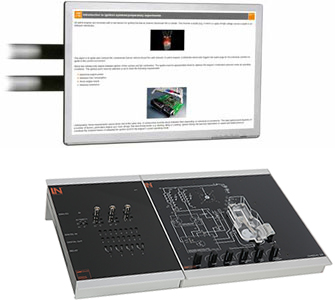Ignition Systems UniTrain Course
To ignite the air-fuel mixture, combustion engines have always needed an ignition system. Nowadays such ignition systems have become extremely complex and precise in order to comply with emission standards while at the same time enabling modern combustion engines to unleash their tremendous power. With this training system the trainees come to grips with these topics early on and can use the UniTrain-I system to learn on their own and at their own speed how the ignition system is designed, what can go wrong and how this can be identified. Trainees also learn to carry out diagnostics and maintenance in the area of engine management.

- Design and function of various ignition systems:
- Contact controlled ignition system
- Transistor controlled ignition system with induction sensor (TZ-I)
- Transistor controlled ignition system with Hall sensor (TZ-H)
- Semi- and fully electronic ignition systems (EZ/VZ)
- Components of various ignition systems
- Design and function of spark plugs
- Effect of ignition firing angle on combustion
- Setting ignition firing angle and dwell angle
- Design and function of equipment to set angle by centrifugal force or vacuum
- Generation and distribution of high voltage
- Signal measurements over time from inductive and Hall sensors
- Measurement of the speed signal from an inductive sensor
- Measurements of ignition voltage signals over time
- Ignition parameters
Product: Ignition Systems UniTrain Course
Product Code: CO4204-7C

